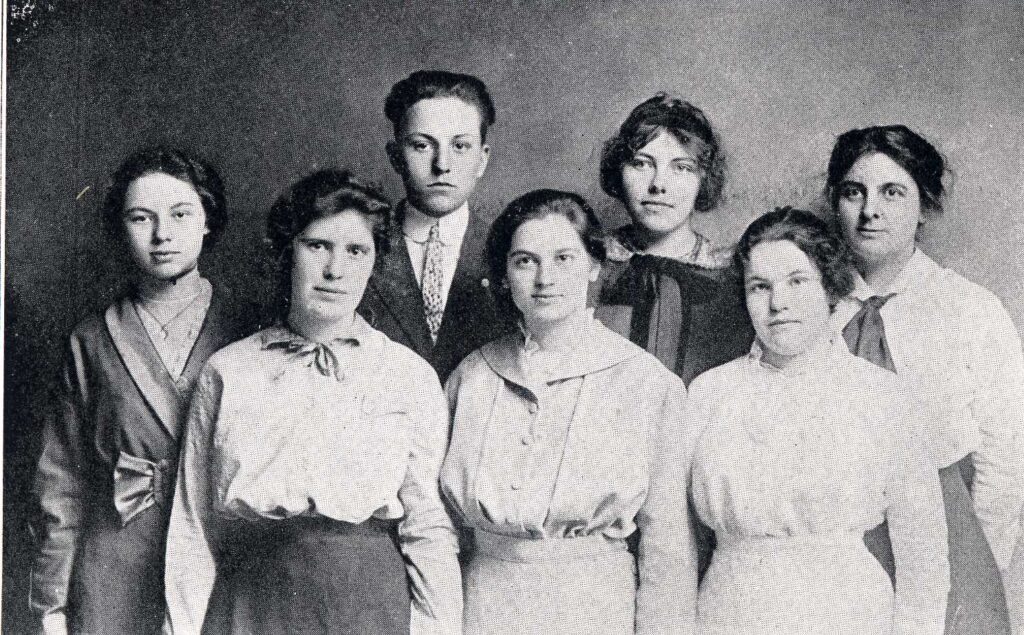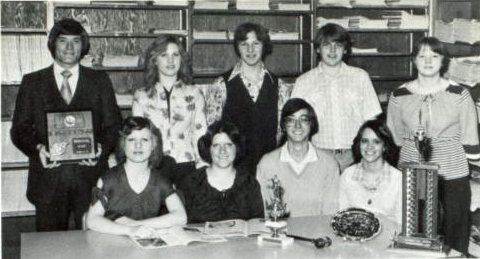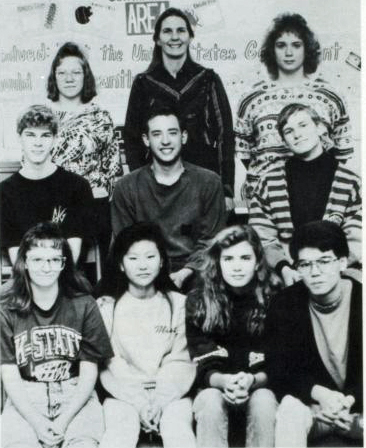The library has bound newspaper copies of the KHS Breezes, from 1947-1981. As I was researching an earlier blog, I read that the 1979 debate team took fourth place in state that year. This interested me as I did not know it when I had the privilege of coaching some talented KHS debater in 1989 and 1990.
Debate is part of the Kansas State High School Activities Association (KSHSAA), just like basketball, football and volleyball. Each year, a topic is assigned and school teams research it and become prepared to argue on both the affirmative (pro) and negative (con) sides of the question. To win, a team must be able to effectively argue on either side they are assigned within time limits. Competing school teams meet at tournaments where judges listen and award a winner of each round.
Competitive debate began at KHS in November, 1913, shortly after the original voluntary Kansas high school sports organization, called the Debate League and Athletic Association, was started. This organization would later become the KSHSAA in 1937.
KHS’s first debate team was formed by having tryouts in the auditorium before the public. The three questions put forth were: 1) Resolved: That voting should be compulsory, 2) Resolved: That letter postage should be reduced to 1 cent, 3) Resolved: That the old soldier’s pensions should be discontinued.
The winners made up two 3-member teams consisting of Olga Leap, Winifred West, Ruth Turner, Mable Erwin, Vera Fuse and Albert Wilson.

Debate tournaments were spectator evens, just like sports. KHS continued to have an extracurricular debate team until 1918 when the Spanish flu epidemic cancelled the competitions – shades of 2020. It seems to have started up again and went until 1929 when maybe the Depression caused its demise.
A quick glance at other KHS Breezes and yearbooks makes me believe it did not return until 1978 when it became a class and two people composed a team on the squad. At that time, the school paper reported that “Debate class is not an easy one. It requires a lot of time and sacrifice, but it 1) develops leadership, 2) improves one’s speaking abilities, 3) helps one develop research and investigation techniques, 4) encourages participation in social issues, 5) helps one make mature judgement, 6) fosters honesty, 7) develop courage and determination, and 8) promotes logical decision making.”
The next year, Coach David Cooper’s team consisting ofKenton Kersting, Kim Kurth, Sharon Harnish, Karen Harnish, and Norman Hirsh took second place at regionals while debating the question, Resolved: That the federal government should significantly change foreign trade policies. The novice, or first year team members that year wereKathie Maley, Peggy Marcy, and Shane Shanks.

Kinsley hosted a tournament in 1979 in which Richard and Jane Wenstrom served as judges. Judges can be people familiar with debate or just “ordinary” people as Richard said in an article he wrote for the Nov. 21 issue of KHS Breezes. He ended his article with the following. ”It seems to me that debate experience would be excellent preparation for any occupation….Our community, our nation, and the world badly needs people who can express, and defend their point of view in a logical, persuasive, organized manner.”
The team traveled to state and heard Keith Akins, Director Washburn Speech Activities, say in his welcoming speech, “Anyone can ‘wing it’ and give a windy, half-hour talk about nothing, but you, as debaters, are able to make solid and succinct presentations. We need more like you in today’s society.” The team placed fourth that year.
Another high point in KHS Debate, occurred in the 1990 season when the team took Second Place at regionals and again earned the right to be one of eight teams to compete in the 2-A state tournament.
The squad that year was made up of: Seniors Jared Froetschner, Ty Holborn, Abe Houdeshell, and Misty Houdeshell; Juniors Shari Duggar, Kathy Kregar, Jacob Schmitt; and Sophomore Jenny Brake and Becky Schinstock. The topic was, Resolved: That the U. S. government should significantly increase space exploration beyond the Earth’s atmosphere.

KHS does not currently offer debate class, but lately, I have been thinking about the valuable life-skills competitive debate teaches.
It forces a person to research and be able to argue with facts and experts on both sides of an issue. Through this research, fallacious arguments are identified on both sides, offering the opportunity for rebuttal with logic and truth. If someone doesn’t understand the facts, if they are taking facts out of context, or just making up facts, it is identified and exposed.
To do this, debate research must come from a variety of sources – both those that support and those that are opposed to an argument. Today it is reported that most of us get our information from only one source and one side of an argument. This does not allow for understanding of the opposition and discussion on the honest merits of an argument.
Debate also teaches that, importantly, no matter what the source is, it should be challenged for authenticity and backed up by other independent sources. Just because something is written or said, does not mean it is true. Sadly today, most people post and repost on social media with no questioning, research or verification.
This leads me to a challenge. Next time you find yourself in an argument, call a time out. Then switch sides and honestly argue against your personal belief. You might even do a little research. This may offer new revelations of understanding and a focus on facts.
